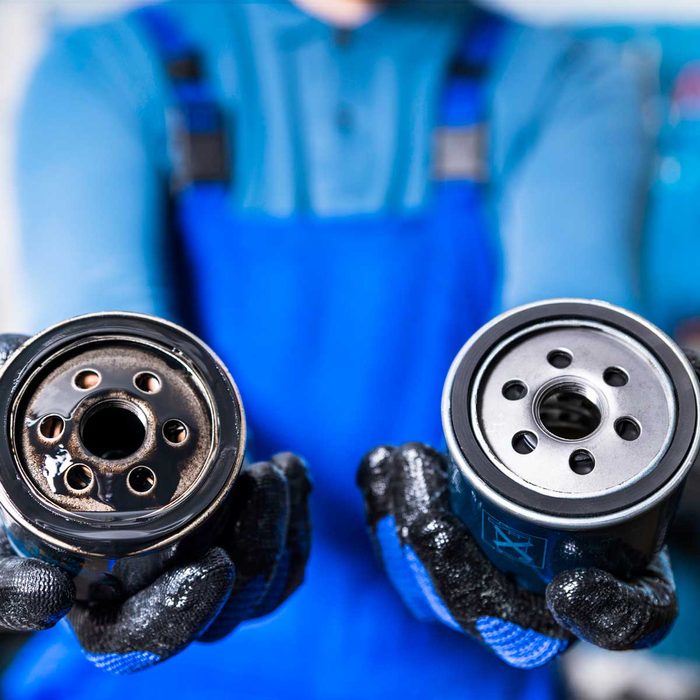Why Is My Oil Filter Leaking?
Updated: May 27, 2024

An oil leak can leave a few drops or a big puddle under your engine. Ignoring a leaky oil filter can quickly lead to expensive engine damage.
There are seven common reasons why an oil filter leaks. Knowing the possible causes will help you determine what steps you should take to correct the problem.
To remove contaminates before it starts its lubricating cycle, motor oil is fed directly from the oil pump through the oil filter. Under full oil pressure, a seemingly minor oil filter leak can quickly turn catastrophic. Unless oil is gushing from the oil filter, in most cases replacing an oil filter is a DIY operation. Never try to repair or reuse an oil filter.
On This Page
Double Gasket
The most common mistake that happens while changing the oil filter is the “double gasket.” This happens when an oil filter is replaced. The old filter gasket sticks to the engine, and the new oil filter and gasket are installed on top of the old one.
After removing the old filter, check that its gasket is still mounted on the filter. If you accidentally double-gasket an oil filter, hopefully it will blow out (creating a nasty mess) as soon as the engine starts and not as you’re driving down the road.
Oil Filter Gasket
Check the rubber mounting gasket to make sure it is not cut, nicked, twisted or damaged in any way, and is properly seated and snug in the filter baseplate. Always install a new filter if the gasket is bad.
Be sure to clean the area where the gasket contacts the engine of dirt and grime and completely remove any old gasket material that may stick to the mounting surface. Use a degreaser to clean the gasket-contact surface and use your finger to spread a thin coat of new oil on the gasket before installing a new filter.
Over- or Under-tightening
Besides making it difficult to remove when replacing the oil filter, over-tightening can crush the filter gasket, causing it to leak. When not properly tightened, any vehicle part designed to seal against a leak will loosen from normal engine or driving vibrations and cause leaks.
Oil filters should be “hand tight” and then given a one-quarter turn to securely fasten without being too tight. Never use an oil filter wrench to tighten an oil filter — only to remove it.
Oil Filter Mounting Adapter (Filter Housing)
To mount an oil filter, some manufacturers use a filter adapter or housing that bolts to the engine, rather than attaching directly to the engine. Over-tightening the filter can damage not only the oil filter gasket, but the gasket between the adapter and engine.
Check that the nipple onto which the filter threads is tight inside the adapter. Nipples can be threaded on both sides and can loosen when unscrewing the old oil filter. The filter gasket may not fully seat if the threads are loose and leak. Leave this fix to your mechanic.
Damaged Threads
An oil filter’s baseplate threads are softer than the threads on the mounting nipple and can be cross-threaded if the oil filter is screwed on crooked when it’s installed. You’ll need to install a new filter if the threads are damaged. If you screw on the new filter without any problems, and there are no apparent oil leaks, it’s still a good idea have your mechanic check out the filter mounting nipple threads for damage.
Wrong Filter
Check your owner’s manual for the correct filter number for your specific engine. A filter may feel as though it is tight when installed, but the threads may not be exactly the same as the mounting nipple. This will cause the filter to loosen up and leak over time.
Also, the wrong filter may have the incorrect by-pass valve. The by-pass value opens to protect the engine from oil starvation if the filter becomes clogged. If you’re not sure you are installing the correct filter, leave it to your mechanic.
Damaged Oil Filter Housing
A rock, stone or road debris can puncture the oil filter outer housing shell. If oil is spurting from the filter, turn your engine off and immediately call for a tow to your repair shop.
Is it the Filter?
Oil from the oil pressure sensor, or just about any other engine gasket or seal, can leak over the oil filter. If the oil filter itself is not leaking, it’s important your mechanic verifies which seal or gasket is the culprit.
The most common cause of oil leaks is lack of maintenance. Going too long between oil changes causes oil to break down and become contaminated. Contaminated oil attacks and degrade gaskets and seals, which results in oil leaks.
An oil filter removes contaminants from engine oil. Replacing the oil filter every time the oil is changed is one of the least expensive and most effective ways to prolong engine life. Always follow local guidelines to properly dispose of used motor oil and filters. If you’re unsure what is causing a leak, have your mechanic check it out. Repairing leaks will save you from costly repairs.
